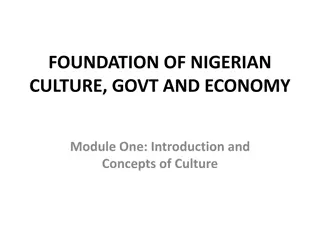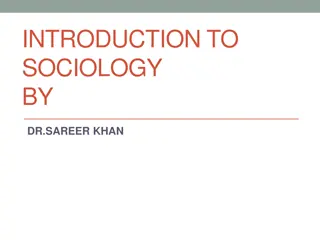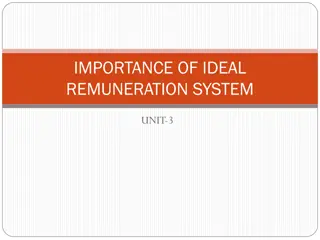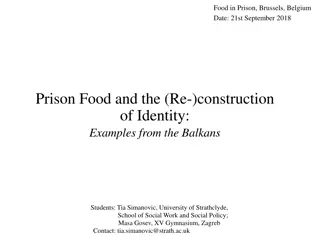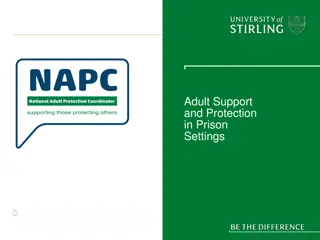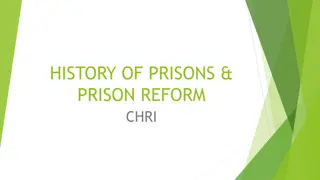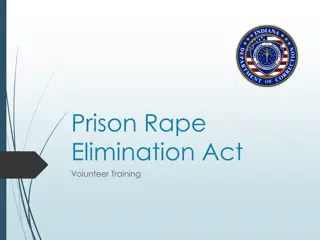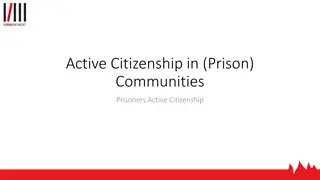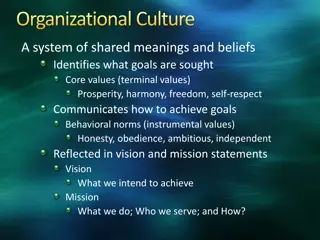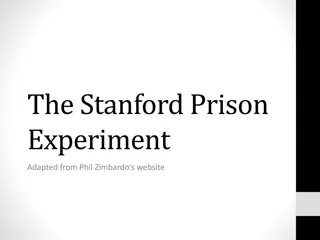Exploring Prison Culture, Masculinities, and Factors Influencing Performance
The discussion delves into the intricacies of prison culture, focusing on the interaction of unique characteristics, demographics, and norms, particularly within a masculine environment. It analyzes the prevailing hegemonic, subordinate, and oppositional masculinities in prisons, as well as the environmental and individual factors influencing the performance of masculinity.
Download Presentation

Please find below an Image/Link to download the presentation.
The content on the website is provided AS IS for your information and personal use only. It may not be sold, licensed, or shared on other websites without obtaining consent from the author. Download presentation by click this link. If you encounter any issues during the download, it is possible that the publisher has removed the file from their server.
E N D
Presentation Transcript
PRISON, CONFLICT & MASCULINITIES DR MICHELLE BUTLER 15THOCTOBER 2014 QUEEN S UNIVERSITY BELFAST
PRISON Prison culture shaped through an interaction of: Unique characteristics of the prison environment (Sykes, 1958 deprivation model) Characteristics people bring with them into the prison (Irwin & Creseey, 1962 importation model). Predominately men in prison so tends to be a masculine environment though this does vary depending on time, prison demographics, cultural norms, age and ethnicity.
UK PRISON People detained in prison are predominately: Men White (though higher than expected levels of ethnic minorities) Young (aged 18-32) Working class Economically disadvantaged area Previous criminal history Alcohol/drugs misuse Learning, behavioural and mental issues Early school leavers Patchy previous employment (Penal Reform Trust, 2013) People working in prison are predominately: Men White (low ethnic minority representation) Middle aged (aged 35-45) Military background though this is changing in recent years Similar educational profiles as those involved in manual labour except for those involved in graduate entry programmes Mainly working class background though this is changing. (Liebling, Price & Shefer, 2010)
PRISON MASCULINITIES Prison hegemonic masculinities tend to focus on toughness / hardness , not showing emotion, independence, standing up for yourself and what you believe in, violence and the threat of violence, power, as well as physical build and strength. Subordinate masculinities include those who are homosexual, tend to keep themselves to themselves, focused on maintaining relationships with family and avoiding masculine competitions amongst prisoners. Oppositional masculinities include those who are too weak to cope, very emotional, those who have been sexually assault in prison and those who have committed sex crimes against children. (See Evans & Wallace, 2008; Sim, 1994)
FACTORS INFLUENCING PERFORMANCE OF MASCULINITY IN PRISON Environment (Deprivation model) 1. Regime, design and management 2. Culture and norms 3. Prison population characteristics (staff & prisoners) Individual (Importation model) 1. Personality , cognitions and other psychological factors 2. Culture, norms, values and beliefs 3. Behavioural repertories , age and experiences from outside Interaction 1. Prison environment reinforcing/challenging previous culture, norms, beliefs, behaviour and/or cognitions. 2. Coping mechanisms adopted 3. Behaviour in prison impacting on life outside
PRISON AND CONFLICT The conflict in Northern Ireland impacted on the Northern Irish Prison Service (NIPS) in a number of ways: Unplanned & unprepared rapid expansion Inadequate staff training and support Threats, deliberate killings, forced out of communities and increased stress for staff and their families Hunger strikes, dirty protests and concern about human rights violations for prisoners Strained staff-prisoner relationships and staff-management relationships Disproportionate community representation within the prison population (staff and prisoner) Increased focus on security, order and control Stereotyping and dehumanisation of prisoners and staff Reduced legitimacy of the NIPS in certain sectors of the community
Conflict exaggerated the tensions and consequences of the performance of masculinity in prison for both prisoners and staff.
MASCULINITY & WELL-BEING There s a [prison psychologists], she operates the clinic [ ] if you wish to speak [to her], but hold on a minute, once I leave my workplace and go to speak to her, I ve got the whole place looking and saying what s his problem. [ ] You can t show a soft side so you don t show any form of weakness whatsoever unless you really, really trust someone but you don t want to show that on a landing in front of other inmates [and] it s no different amongst staff. (Staff) I wasn t reared up being bossed about and I wouldn t have took it. I wouldn t have took that from someone. And when I came to this place I still had that kind of same attitude. I wouldn t have took it from people. [ ] I started cutting myself with spoiled razor blades and stuff. I was took out to the hospital with suicidal ideas and I couldn t hang myself, they took everything off me and I had a padded suit and a room, an observation cell with a camera and it just got to a point where I just didn t care. (Prisoner)
MASCULINITY & WELL-BEING A lot of staff have been through 30 or 40 years of conflict. They have had to go and check under their cars and a number of prisoner officers have been killed. I ve nearly been murdered a couple of times in the Maze. When people try and kill you, you do end up forming your own views. [ ] But they are still trying to kill people today. Just there today I have had two emails from security warning me about my personal security. I have had to send people up to buy knee pads and mirrors so that they can check under their cars for car bombs. Many people think that it has stopped but they are trying to cover it up. (Staff) There s no doubt about it, that [working during the Troubles] affected people [...] I have seen all sorts of avenues, people turn to drink, people get liquored up and I m not a big drinker at all, thank God, but I ve seen so many, you see what we had then, we had, they were absolute recipes for marriage break ups, disastrous, we had long hours with stacks of money. (Staff)
MASCULINITY & POWER I ve always found the prison disciplinary process to be run by a bunch of fucking jumped-up power-hungry fucking scumbags that think they are something. (Prisoner) We ve some bad, bad people, some really bad people in here, and we have to [lay down the law]. [...] They re just bad. And some of them do have disorders, some of them, especially the younger ones; I find the younger ones have anger management issues. (Staff) The worst thing is the communication with prisoners and staff. Communication is a big thing. They treat you like you re a wee kid. But, this is a man s jail. We aren t wee kids, but they will treat you like that. Talk to you like you re an idiot. (Prisoner)
MASCULINITY & POWER Not that they re trying to control the behaviour, they re trying to say, they re always trying to get on top of you like this is Northern Ireland and we are the Northern Irish officers, know what I mean ? You do what we tell you, instead of being the facility to deal with criminals, this facility will tell you where you stand in society, know what I mean, you get what I m saying? (Prisoner) It s more like, officers in this place have worked in the prison service for more than 30 years or something, 40 years, and they re used to working with division through the Troubles. And now that it s supposed to be a shared society like and it s not, it s different, it s not, you re always stuck in the same mind-set, you know the way they treat people. [ ] They think by wrecking the cells is a defiance against the state when a Catholic does it, it s a defiance against the state rather than a defiance against the system, you know. [ ] It s just in their head [ ] they don t sit down and talk about anything. It s just what, they started this job when they re about 20 or something and they ve worked here for about 30 or 40 years and they ve grew up with this kind of mind-set , know what I mean? (Prisoner)
MASCULINITY & POWER The Unionist Present Service is what the call us but you know I have and I know the word pleasure shouldn t be used as a word but I have never differentiated between anyone because of their faith. A prisoner is a prisoner and I will lock up a man who is a Roman Catholic who is the biggest IRA supporter with the same degree and pleasure of a man who is the biggest Protestant and the biggest UVF because of my opinion they are a prisoner. [ ] a lot of them think Oh I am going to be picked on because I am Catholic and these boys are all Protestants so they are not going to let me off . (Staff) There is a significant proportion of underclass areas [ ] who have grown up with a very unhealthy disrespect for law and order and all its facets. [ ] And it s true both of Catholics and Protestants you know there is no respect on both sides and [ ] You reap what you sow. For 35 years, people have been told in West Belfast that the police are the enemy. You throw bricks, you throw bottles. [...] That is the only way they know to, you know, express their dissatisfaction with the police and you reap what you sow sometimes. (Staff) Someone shouted out all their [staff] addresses in Maghaberry and they thought it was us and so from there on we didn t get on with them like. (Prisoner)
MASCULINITY & DEFENSIVE REACTIONS We are told, If [officers] can t adapt it s your fault . That s a view point from prison service management. If you cannot adapt it s your fault, you re the inadequacy, not us. We are telling you to adapt, if you can t adapt it s your fault. That is what we get from Prison Service Headquarters. [ ] It is ignorance. (Staff) There are people that definitely need to leave this job. Apart from being battle weary for want of a better word, they just can t cope with the job in this current climate, to where it is now, cause lots of things are changing and most people I think need to go. [...] [Director General of the NIPS] gonna offer those people an exit package. Now, alright depending on the individual whether he or she takes it and the only thing is in the back of my mind, it s a personal, I would hate to think that somebody along the way thinks [ ] I would hate to think somebody along the line is going to turn round and say, He s away cause he s dysfunctional . (Staff)
MASCULINITY & DEFENSIVE REACTIONS I think we see the long knives are out for us and as we always say the knives in the Northern Ireland Prison Service are so sharp you don t even feel them going into your back. And we feel that the knives are out for us, we feel that the knives are coming from every corner and they are out to get us because we cost too much, because we are white male Protestants, because we are all over 45, because you know there is a multitude of reasons that are valid or invalid but maybe it s just all in our head but we see that the long knives are out for us and they are coming to get us. [ ] The officers in this prison and throughout the prison service, we are very insular. We have been ostracised from society for so long that we are so insular that we are like a closed shop. We are very united through our membership of the POA [Prison Officer Association] and whether we personally may ridicule the POA, we can do that but others can t. [...] So, I think we close ranks and our silence says it all. And the management can hear our silence very well so we really don t need to tell them much, they know [...] they never do anything about it. (Staff)
NEXT STEPS NIPS reform programme underway to attempt to address some of the criticisms of the prison service and improve quality of life and efficiency of the NIPS. Substantial changes to staff through early retirement scheme and new recruitment campaign. However, concerns remain about the: Extent to which the legacy of the past has been adequately addressed. Continuing masculine nature of the prison environment Staff training and support services
FURTHER READING Butler, M. & Maruna, S. (2012) Discipline and Disparity: An Independent Report for the NIPS. Cambridge: ARCS Ltd. Evans, T. & Wallace, P. (2008) A prison within a prison?: The masculinity narratives of male prisoners , Men and Masculinities 10 (4):484-507. Irwin, J. & Cressey, D. (1962) Thieves, Convicts and the Inmate Culture , Social Problems, 10, 142-155. Liebling, A., Price, D. & Shafer, G. (2011) The Prison Officer (2nd ed). Cullompton: Willan. Penal Reform Trust (2013) Bromley Briefings Factfile: Full Report. London: Penal Reform Trust. Sim, J. (1994) Tougher than the rest? Men in prison , in T. Newburn & E. Stanko (eds) Just Boys Doing Business? Men, Masculinities and Crime. London: Routledge. Sykes, G. (1958) The Society of Captives: A Study of a Maximum Security Prison. Princeton: Princeton University Press.




